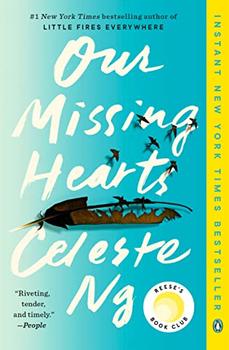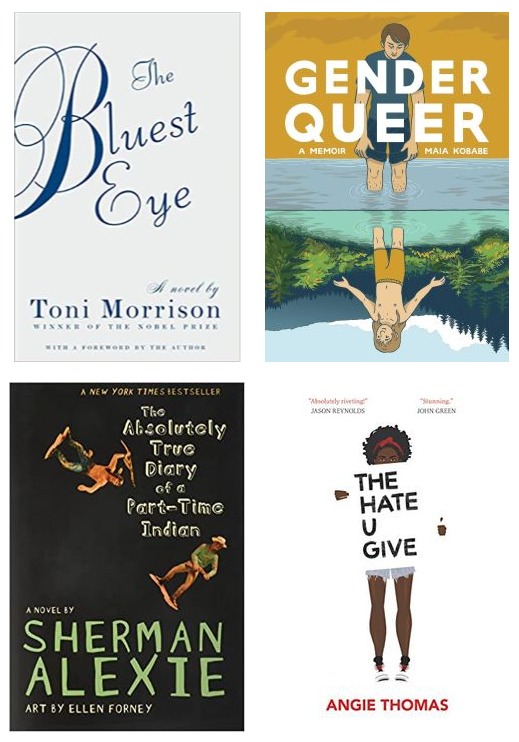Summary | Excerpt | Reading Guide | Reviews | Beyond the Book | Read-Alikes | Genres & Themes | Author Bio

A Novel
by Celeste NgThis article relates to Our Missing Hearts
 Celeste Ng's novel Our Missing Hearts is set in an alternate present in which the U.S. government has passed the Preserving American Culture and Traditions Act, which regulates, among other things, cultural influence deemed not sufficiently American. The main character's mother is a Chinese American poet whose works have been banned under the act. Ng's book is a product of the wave of reactionary racist, xenophobic attitudes in the U.S., and book banning is one way those attitudes are manifesting.
Celeste Ng's novel Our Missing Hearts is set in an alternate present in which the U.S. government has passed the Preserving American Culture and Traditions Act, which regulates, among other things, cultural influence deemed not sufficiently American. The main character's mother is a Chinese American poet whose works have been banned under the act. Ng's book is a product of the wave of reactionary racist, xenophobic attitudes in the U.S., and book banning is one way those attitudes are manifesting.
According to the American Library Association (ALA), 1,597 individual books were targeted for censorship or removal from libraries in 2021, the highest number since the ALA began keeping track over 20 years earlier. 2022 will break the record again, as there have been 1,651 books targeted between January and the end of August. ALA President Lessa Kananiʻopua Pelayo-Lozada states that the uptick in book banning attempts reflects "national efforts to silence marginalized or historically underrepresented voices."
The majority of the books that have been targeted feature content related to people of color and/or LGBTQ+ people — a direct result of conservative political rhetoric around the ideas that critical race theory is being taught in schools and that teaching kids about queer lives is a means of "grooming" or "recruiting" them. The most frequently targeted book in 2021 was Maia Kobabe's Gender Queer, a graphic memoir about the author's journey coming to terms with their nonbinary gender identity and queer sexuality. Other books in the ALA's top 10 most challenged books list for 2021 include The Hate U Give by Angie Thomas, The Absolutely True Diary of a Part-Time Indian by Sherman Alexie and Toni Morrison's The Bluest Eye.
A report by PEN America covering July 2021 to July 2022 shows that 41% of the 1,648 books banned in schools over the course of this year feature LGBTQ+-related content, while 40% feature people of color and 21% directly address themes of race and/or racism. (Some titles fall into multiple categories.) The report estimates that 40% of the bans "are connected to either proposed or enacted legislation, or to political pressure exerted by state officials or elected lawmakers to restrict the teaching or presence of certain books or concepts."
Books like Gender Queer and The Hate U Give and other titles on the banned books list educate young people and also allow them to see themselves reflected in literature. While some parents may feel they have a legitimate complaint when trying to ban books featuring sexual content, the PEN report states that only 22% of books were banned for this reason. Most who seek bans for race- or queer-related content do not want queer people and people of color to be positively represented because they believe in white supremacy and heteronormativity and recognize that books can challenge these ideals. This notion is illustrated in Our Missing Hearts by the banning of the main character's mother's poetry because it is deemed a challenge to the white, Western supremacy represented by the Preserving American Culture and Traditions Act.
Filed under Books and Authors
![]() This "beyond the book article" relates to Our Missing Hearts. It originally ran in October 2022 and has been updated for the
August 2023 paperback edition.
Go to magazine.
This "beyond the book article" relates to Our Missing Hearts. It originally ran in October 2022 and has been updated for the
August 2023 paperback edition.
Go to magazine.
Your guide toexceptional books
BookBrowse seeks out and recommends the best in contemporary fiction and nonfiction—books that not only engage and entertain but also deepen our understanding of ourselves and the world around us.